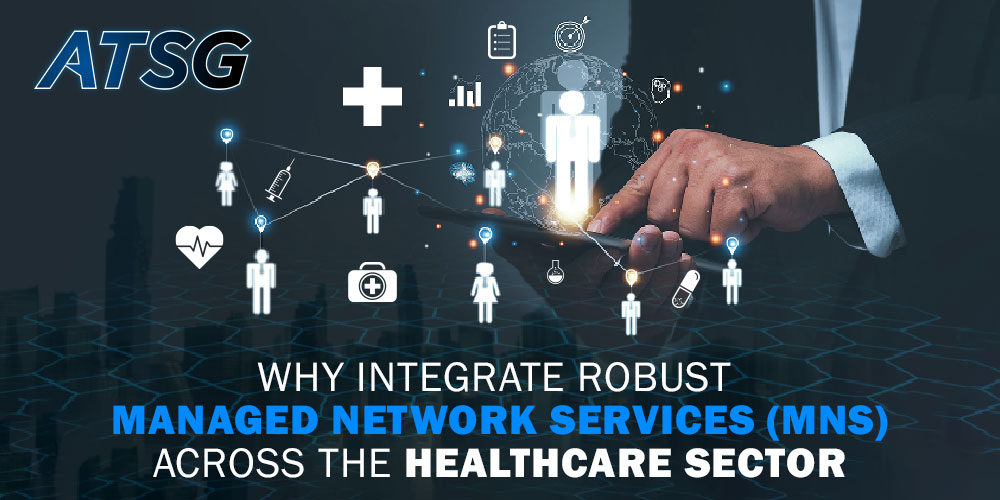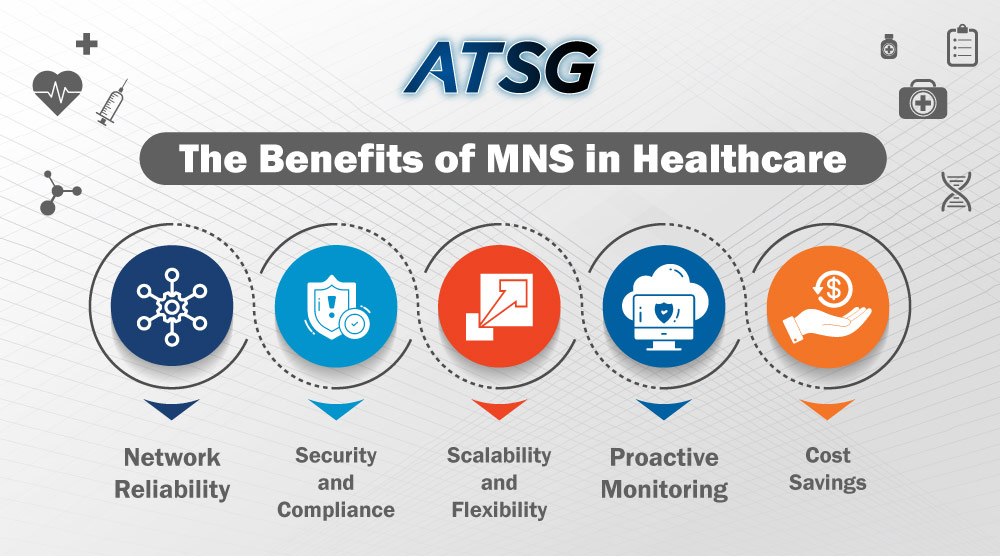With the use of technology in the healthcare services sector, exposure to cyber crimes and other malicious activities increases. Therefore, it is essential to integrate managed services and support across these facilities, to benefit from technology whilst maintaining critical information and security across the organization.
Managed Services are vital for any organization dealing with sensitive client information, none more so than the healthcare sector. Outsourcing managed network services (MNS) for healthcare organizations enables the optimization of patient care, streamlines administrative processes, and helps remain Health Insurance Portability and Accountability Act (HIPAA) compliant.

The article circulates on features of managed network services that improve the performance of healthcare providers, and enhance the use of technology across the sector. With people’s “lives on the line”, there is no room for technical glitches, which makes MNS a critical component for healthcare providers. MNS can monitor, secure and optimize healthcare systems round-the-clock, so that healthcare practitioners can focus on providing highest quality healthcare.
What are Managed Network Services (MNS)?
Networks form the backbone of the digital world, emerging as a vital component of modern businesses, especially post-pandemic. Cementing the network’s role as a vital contributor to success, organizations believe it improves computing application performances, and also helps achieve business goals. Managed network services are network applications and services that are outsourced, managed, and maintained by a Managed Services Provider (MSP), such as ATSG.
. With MNS, organizations can rely on experts and professionals that can manage and monitor the network and its related operations. They manage everything from private servers to devices, cybersecurity, and data storage. Managed network services facilitate cutting-edge technology at a fraction of the cost of having such capabilities in-house. It deploys 24/7 remote monitoring, in case of any cyber threats. Additionally, organizations can leverage access to professionals that can handle tasks and operations efficiently.
Why Integrate MNS in Healthcare Organizations?
Managed network services for healthcare are proving a game-changer. They take over the tiresome, redundant, yet critical IT functions, and let professionals focus on providing healthcare facilities and mitigating the chances of any risks. With the healthcare sector being one of the most sought-after targets for cybercriminals, using outdated and legacy systems increases vulnerabilities. Therefore, investing in top-notch MNS providers can entail protection, security, and seamlessness in workflows.
The Benefits of MNS in Healthcare
Managed network services can indeed be beneficial for the healthcare sector, as it heavily relies on technology and connectivity to deliver efficient and effective patient care.
The following reasons explain why managed network services are important in the healthcare sector:-

Network Reliability
A stable and reliable network is crucial for un-interrupted access to critical patient data, electronic health records (EHRs), and other healthcare applications. Managed network services ensure that the network infrastructure is properly maintained, monitored, and optimized for maximum up-time.
Security and Compliance
Healthcare organizations deal with sensitive patient information that must be protected in accordance with strict privacy regulations, such as the Health Insurance Portability and Accountability Act (HIPAA). Managed network service providers can implement robust security measures, including firewalls, intrusion detection systems, and encryption protocols, to safeguard patient data from un-authorized access and cyber threats.
Scalability and Flexibility
Healthcare facilities often need to expand their network infrastructure to accommodate growing patient volumes, additional medical devices, and remote access scenarios. Managed network services can help design and implement scalable network architectures that can adapt to evolving needs, without compromising performance or security.
Proactive Monitoring
Managed network service providers can monitor the network infrastructure round the clock, detecting and resolving potential issues, well before they can adversely impact patient care. With proactive monitoring, networking outages or slowdowns can be minimized, ensuring un-interrupted access to critical applications and reducing downtime.
Cost Savings
By outsourcing network management to a specialized provider, healthcare organizations can reduce the burden on their internal IT staff, and avoid the costs associated with hiring and training additional personnel. Managed network services are generally offered on a subscription or pay-as-you-go basis, allowing organizations to optimize their IT budgets, and allocate resources more effectively.
Disaster Recovery (DR) and Business Continuity (BC)
Healthcare providers cannot afford to have their network infrastructure go down, as it can severely damage and impact patient care as well as operations. Managed network services can include disaster recovery planning, backup solutions, and redundant network configurations, to ensure that critical systems remain accessible during emergencies and unforeseen contingencies.
Choosing the Most Suitable MNS Provider
In-house IT resources are often limited, and unable to provide the “bandwidth” required for effective managed network services. This in turn makes managed services providers the go-to source. Finding the right MSP is also part of the hassle that organizations have to face, to achieve the best possible service across the industry. In terms of the healthcare sector, several factors are essential when looking for MNS providers.
The following list comprises of the key ingredients to consider, when integrating an MNS provider:-
1. Protection of Healthcare Provider’s Network
2. Sensitive and Confidential Medical Records Protection
3. Delivering Secure and Efficient Telehealth and Telemedicine Services
Outsourcing the management of such intricate tasks can give healthcare organizations the time and resources to focus on the central elements of quality healthcare delivery. This boosts operational efficiency and helps prevent long-term IT problems that may disrupt the flow of services. Moreover, it helps healthcare services providers mitigate cyber-attacks and malicious activities with robust network security.
ATSG is a globally leading provider of Managed IT Services and Intelligent Technology Solutions. The company provides an efficiently managed network system that can improve the overall performance and operational role of network, across the entire healthcare organization.
ATSG – A Leading Provider of MNS
Managed Network Services are pivotal for healthcare organizations to achieve rapid and secure digital transformation. ATSG Optanix (OPTX) was recognized as a Leader in Gartner® Magic Quadrant™ for Managed Network Services (MNS) in 2022.
ATSG offers healthcare organizations a well balanced approach to combine security, people, processes, and technology into a high quality healthcare service. As a global leader in digital transformation solutions, ATSG’s services provide a proactive and predictive network management system to healthcare providing institutions.




